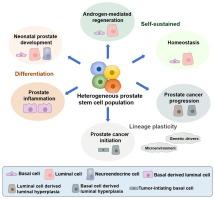前列腺癌中形成耐药格局的癌症干细胞可塑性
IF 13
1区 综合性期刊
Q1 MULTIDISCIPLINARY SCIENCES
引用次数: 0
摘要
前列腺相关疾病在老年男性中发病率极高,包括良性前列腺增生(BPH)和前列腺癌(PCa)。前列腺干细胞对前列腺发育、成体组织稳态和损伤修复至关重要,也被认为是肿瘤发生的潜在起源细胞。最近的研究表明,各种前列腺干细胞群在前列腺疾病的发生和发展中起着关键的驱动作用,同时也有助于治疗抵抗。因此,前列腺干细胞已成为基础研究和临床转化研究的有希望的治疗靶点。本文综述了各种前列腺上皮干细胞的特性,阐述了不同前列腺上皮干细胞在生理和病理条件下的细胞命运和功能。此外,本综述提供了前列腺干细胞谱系可塑性与前列腺疾病中观察到的耐药之间联系的理论证据,并批判性地讨论了新兴干细胞靶向策略的局限性和治疗潜力。本综述整合了前列腺干细胞亚群在生理和病理背景下的身份和细胞可塑性的当代知识,包括前列腺发育、组织稳态、炎症反应和肿瘤发生。这些干细胞表现出对微环境挑战的关键适应性,在上皮再生、肿瘤发生和肿瘤进化中发挥重要作用。值得注意的是,它们动态重编程细胞命运轨迹的能力已被证明从根本上支持治疗逃避机制,促进治疗耐药性的出现。总的来说,这些见解将前列腺干细胞的分子靶向定位为治疗晚期前列腺恶性肿瘤的新治疗范例。本文章由计算机程序翻译,如有差异,请以英文原文为准。

Cancer stem cell plasticity in shaping drug resistance landscapes in prostate cancer
Background
Prostate-related diseases exhibit an extremely high incidence among aging males, including Benign Prostatic Hyperplasia (BPH) and prostate Cancer (PCa). Prostate stem cells are critical for prostate development, adult tissue homeostasis, and injury repair, and are also considered potential cells of origin for tumorigenesis. Recent studies have demonstrated that various prostate stem cell populations serve as key drivers in both the initiation and progression of prostatic diseases, while also contributing to therapy resistance. Consequently, prostate stem cells have emerged as promising therapeutic targets for both fundamental research and clinical translational studies.Aim of review
This review provides a comprehensive summary of the identity and characteristics of various prostate epithelial stem cells, elaborating on the cell fate and function of different prostate stem cells under both physiological and pathological conditions. Additionally, the review offers theoretical evidence linking the lineage plasticity of prostate stem cells to the drug resistance observed in prostate diseases, and critically discusses both the limitations and therapeutic potential of emerging stem cell-targeting strategies.Key scientific concepts of review
This review integrates contemporary knowledge regarding the identity and cellular plasticity of prostate stem cell subpopulations across physiological and pathological contexts, encompassing prostate development, tissue homeostasis, inflammatory responses, and oncogenesis. These stem cells demonstrate critical adaptability to microenvironmental challenges, underpinning essential functions in epithelial regeneration, neoplastic initiation, and tumor evolution. Significantly, their capacity to dynamically reprogram cellular fate trajectories has been shown to fundamentally underpin mechanisms of therapeutic evasion, fostering the emergence of treatment resistance. Collectively, these insights position the molecular targeting of prostate stem cells as a novel therapeutic paradigm for managing advanced prostate malignancies.求助全文
通过发布文献求助,成功后即可免费获取论文全文。
去求助
来源期刊

Journal of Advanced Research
Multidisciplinary-Multidisciplinary
CiteScore
21.60
自引率
0.90%
发文量
280
审稿时长
12 weeks
期刊介绍:
Journal of Advanced Research (J. Adv. Res.) is an applied/natural sciences, peer-reviewed journal that focuses on interdisciplinary research. The journal aims to contribute to applied research and knowledge worldwide through the publication of original and high-quality research articles in the fields of Medicine, Pharmaceutical Sciences, Dentistry, Physical Therapy, Veterinary Medicine, and Basic and Biological Sciences.
The following abstracting and indexing services cover the Journal of Advanced Research: PubMed/Medline, Essential Science Indicators, Web of Science, Scopus, PubMed Central, PubMed, Science Citation Index Expanded, Directory of Open Access Journals (DOAJ), and INSPEC.
 求助内容:
求助内容: 应助结果提醒方式:
应助结果提醒方式:


